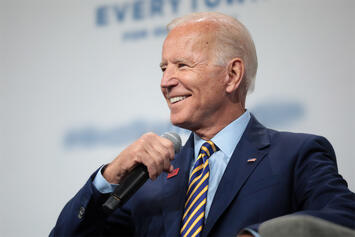
For a policy that requires sacrifice, at least for the masses, the climate agenda lacks one critical element: public support. Even in ultra-green Europe, there is a growing resistance among politicians and the public towards extreme climate policies. In America, too, climate scepticism is growing. Given that Joe Biden rolled out new pollution standards for non-electric cars last week, this public shift should provide discomfort among the Democratic establishment.
While most Americans concede that climate change is real, it’s not much of a priority: only 2% rate it as their major concern, according to Gallup, well below the figures for immigration, inflation, government competence and reducing poverty. These sentiments are even more pronounced among working-class voters: even as the Biden administration expends hundreds of billions in taxpayer funds to “green projects”, the average American doesn’t want to spend more than $2.50 a week to combat climate change.
Now, instead of mobilising the masses, the climate lobby increasingly rejects the idea of popular consent. In the EU, the US and individual states such as California, vague legislative goals are left to “experts” for implementation. Aware they are unlikely to get public backing for such things as electric car mandates, consistently higher energy prices or the removal of gas stoves, the climate lobby seeks to employ the bureaucracy — in concert with academics and nonprofits — to impose policies which lack public support.
Some climate activists see the Covid-19 lockdowns as a “dry run” for future action. Officials at the United Nations endorse this concept, embracing the pandemic as a “fire drill” for what must happen to meet climate goals.
But perhaps the more relevant model may be that of the “corporate state”, most associated with the fascist regime of Benito Mussolini. Some might see Donald Trump as the poor man’s Il Duce, but the powerful alliance of the executive branch with a handful of ultra-rich, ultra-powerful companies is more reminiscent of the corporate state.
In 2020, Biden raised record sums from the corporate elite, notably the tech oligarchs and their Wall Street allies. This year will likely bring unprecedented financial support from these same players to the President’s campaign. This interplay between big corporate interests and activist bureaucracies now constitutes what Bjørn Lomborg has labelled the “climate-industrial complex”.
Read the rest of this piece at UnHerd.
Joel Kotkin is the author of The Coming of Neo-Feudalism: A Warning to the Global Middle Class. He is the Roger Hobbs Presidential Fellow in Urban Futures at Chapman University and and directs the Center for Demographics and Policy there. Learn more at joelkotkin.com and follow him on Twitter @joelkotkin.
Photo: Gage Skidmore via, Flickr, under CC 2.0 License.












